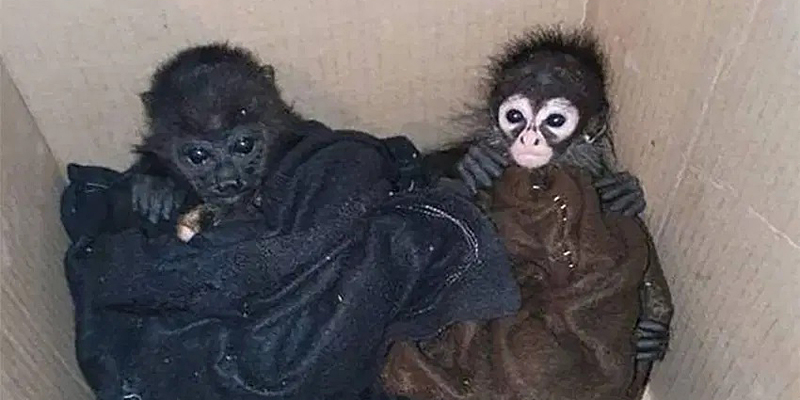| Study Finds Illegal Wildlife Trafficking in Mexico Is ‘Out of Control’ MexicoNewsDaily.com | |
| go to original November 17, 2022 |
|

![]()
After these young monkeys (a spider monkey and a howler monkey) were confiscated from traffickers, the Culiacán Zoo in Sinaloa became their home. (Zoológico de Culiacán)
Illegal wildlife trafficking is rampant in Mexico, according to a study carried out by the Center for Biological Diversity (CBD). The CBD filed a complaint with Mexican state prosecutors, alleging that authorities are largely turning a blind eye to the practice.
“Wildlife trafficking in Mexico is out of control,” the report stated.
Researchers launched an undercover investigation between May and August, visiting markets, scouring digital platforms and interviewing experts.
Several species protected by law, including jaguars, howler monkeys, toucans, parakeets, iguanas, African lions, and Bengal tigers, are openly bought and sold, mainly through social networks such as Facebook and TikTok. While the sale of exotic plants and animals is illegal on these platforms, fake profiles make it difficult to enforce.
Existing legislation in Mexico also makes the problem challenging to address, as the relevant authorities are often complicit in the crime. The study found that the country’s Management Units for the Conservation of Wildlife (UMAs) and Farms that Manage Wildlife (PIMVS) actively participate in the illegal trade alongside organized crime groups. The market is estimated to be worth US$100 billion per year.
“It is really very easy to buy a toucan, a howler monkey or a sloth illegally in our country,” said Alejandro Olivera, the Mexico representative for the CBD.
The Federal Attorney for Environmental Protection (Profepa) cannot determine the whereabouts of most wildlife that is trafficked, with an estimated 97% of cases going unsolved. This amounts to between about 123,000 and 290,000 animals or plants.
The illegal trafficking of exotic wildlife is negatively affecting Mexico’s highly diverse ecosystem as the population of in-demand species rapidly declines. While most of the animals are sold as pets, species such as sea cucumbers and totoabas are sold for consumption as food or medicine.
“As more and more animals are uprooted from their natural habitat, it becomes more difficult to bring back species in sharp decline,” Olivera said.
Read the rest at Mexico News Daily
Related: The Sale of Wildlife Normalized on Social Networks (Excelsior)
Related: Mexico Must Act to Protect Vaquita Marina: Cites Trade Body (Mexico News Daily)
![]() Learn about Conservation of Wonderful Species of Banderas Bay
Learn about Conservation of Wonderful Species of Banderas Bay
![]() Learn about UMA Potrero de Mulas
Learn about UMA Potrero de Mulas
We invite you to add your charity or supporting organizations' news stories and coming events to PVAngels so we can share them with the world. Do it now!
From the Bay & Beyond
Celebrate a Healthy Lifestyle
 From activities like hiking, swimming, bike riding and yoga, to restaurants offering healthy menus, Vallarta-Nayarit is the ideal place to continue - or start - your healthy lifestyle routine.
From activities like hiking, swimming, bike riding and yoga, to restaurants offering healthy menus, Vallarta-Nayarit is the ideal place to continue - or start - your healthy lifestyle routine.